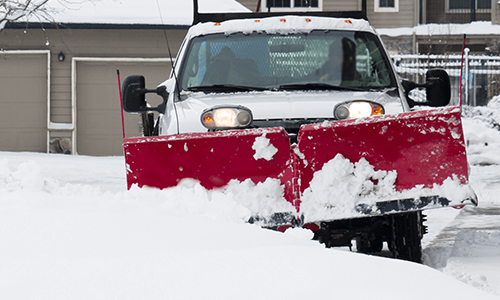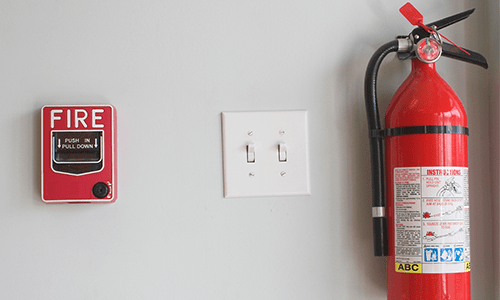On behalf of snow contractors everywhere, if you currently have your snow and ice management contract signed, and/or plan to have it signed on or before October 15th, please consider yourself “HIGH FIVED”. Your pro-active leadership should pay off big time when it counts. Your association should recognize you as a superior board member or property manager. GOOD JOB!
If you are not in the “HIGH FIVE” group, let’s harken back to November 20th of last year. The forecast was for a rain event that would potentially leave a couple inches of snow. What developed was 11.2” of snowfall (O’Hare), with the first 2 – 4” compacting to slush. With temperatures dropping to 27 degrees overnight, any of that mess not plowed off turned to ice.
We received numerous bid requests and signed contracts the 19th and 20th. While we appreciate the business, it put our team through some very serious “pain” over the course of a 72 hour period. Some clients also felt the pain, because there are a lot of logistics, planning, preparation, and communication needed to have the best outcomes.
It is important to take the operator(s) and crew to the site for an inspection and planning meeting to make sure that everyone knows the site and understands the service plan and client expectations. Can you imagine going to the site for the first time during a snow storm (normally in the dark) and trying to figure out plowing operations from a site map? Even if the operator(s) and crew serviced the site the year prior, there may be changes in expectations, from build-outs, or it’s just hard to remember since you have not plowed it in 8 months.
To provide a professional service to clients, contractors find it best to have time to prepare their entire team for individual property needs, characteristics, and expectations.
What are best practices for a successful snow season?
Here are a few recommendations for a successful snow season:
- Sign your contract before October 15.
- Conduct a pre-season meeting with your contractor, Board of Directors, and Property Management to discuss topics such as:
- Are there any special needs home owners that need priority service
- Identify priority or problem areas – action plan to address
- If a tractor or tractors are to be used, where are they to be parked and where can the direct report crew park their vehicles (we strongly recommend direct report)
- What is the plowing pattern? Someone is going to be first and someone is going to be last. They need to know this upfront and that we will flip starting points annually
- Where is it acceptable and not acceptable to pile snow
- Who is the property contact/decision maker prior to and during the event? This person should be accessible 24/7 as conditions are fluid and we are dealing with safety and liability. Your contractor contact must also be accessible 24/7
- Establish a de-icing protocol prior to the season. I.E. – We will not authorize de-icing for any event with the exception of an ice storm. Or – We will authorize de-icing of roads, driveways, walks, and stoops to automatically occur after a plowing operation. Or – We will make a de-icing decision for all events based upon current conditions and forecast. Or – We will not de-ice for any event, but will provide homeowners with ice melt buckets or shaker jugs. Etcetera . . .
- Once all the decisions are made, it is best to tell the homeowners through a homeowner forum, website, newsletter, mailing, etc. It is important that people know how to prepare and for all of us to manage expectations. I.E. – If the association chooses not to approve de-icing applications, homeowners should know to be mentally prepared for potential slippery conditions. This will also guide them in footwear choices. No flippy floppies!
- During the season, your contractor should notify the association and property management prior to an expected snow event, and submit the action plan so that no one is surprised and questions may be discussed prior to the event. A post event recap is also good practice. I don’t know about you, but most days I can’t remember what I had for breakfast, let alone the details of three storms ago. Storm memories tend to blend together.
- If an accident or problem occurs happens, (plow truck hits parked car, tractor hits garage door, equipment breaks, etc.) your contractor needs to be the one to tell the property manager, not the other way around. These things may happen on occasion . . . it needs to be somewhat expected when working in potentially hazardous, slippery conditions, at night, and for extended periods of time. If for some reason a homeowner makes property management aware of an alleged incident, they should notify the contractor immediately for investigation and resolution. A good contractor should own their work and take care of any damage they caused promptly. As an example however, there are some folks that claim that the snow plow company “had to be the one” that scratched their car or dented their garage door. During some investigations we occasionally find that the scratch on the car is thoroughly rusted, and that the dent on the garage door is 8 feet high and looks like a baseball or basketball hit it. 99.9% of clients are good & honest people, but there appears to be a few out there that seem to be a bit “unscrupulous” or confused. Subsequently due diligence is a necessary protocol. Homeowner incident claims should be made known to contractor no later than April 30th. Normally, claims made after April 30th will not be accepted.
- Turf and plant damage from snow plow and de-icing operations supplied by the contractor should be completed no later than April 30th. These are normally at no additional charge and part of the contract specifications.
Facts About Snow Season and Snow Removal
Along with the best practice recommendations for snow season success, please find the following factoids which you may find helpful:
- A skid-steer tractor can plow a standard driveway 2 times faster than a pickup truck.
- Most companies will provide you with a choice between a per occurrence or seasonal contract. Our study shows that as long as you pick one or the other and stick with it, there will only be a variance of +/- 3% in price over time. Note: we have been having some big swings in annual snowfall totals measured at O’Hare, consequently, you will need to stay the course long term. Can you imagine the consternation of an association that chose to change to a per occurrence contract in 2013/14 because we had light snow years in 2011/12 and 2012/13? Ouch!
- 2011/12 19.31”
- 2012/13 30.0”
- 2013/14 81.42”
- 2014/15 49.55”
- 2015/16 29.3”
- Most slip and falls occur at public mailboxes. The second most slip and falls occur in front of the garage door.
- The three most frequent times that an association authorizes de-icing are:
- Ice storms
- Holidays
- Special community events
- The recommended de-icing material for new concrete is magnesium chloride or calcium magnesium acetate.
- The recommended de-icing material for walks and courtyards around substantial plant material is magnesium chloride.
- The recommended de-icing material for walkways with normal turf or bed conditions is a standard magnesium or chloride based product mix in which there are several suitable blends.
- The recommended de-icing material for asphalt is rock salt or treated rock salt.
On a final note, the first average frost date for Chicago is October 24. Another reason that it’s always good to have your snow contract in place by October 15! Thank you very much for listening!




 Fred Schroeder
Fred Schroeder 
 CAI - Illinois Chapter
CAI - Illinois Chapter 


